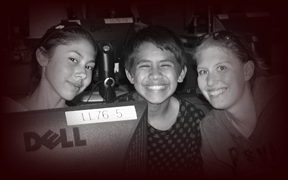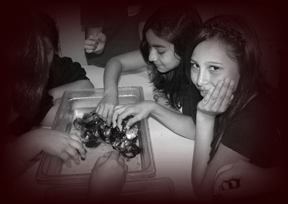"Being an AIR mentor has made me realize that the struggle to attain higher education is a shared struggle among different communities...AIR provided me with a space to share my story as a way to motivate students, but I also saw myself four years ago every time I spoke to a shy insecure student" Ana Resendiz (University of San Diego)
"I believe that those who volunteered their time this spring (2010) grew as individuals just as much as the students; I can attest to this" Jame Speer (San Diego State University Student)
The AIR Program is centered around the concept of mentoring. Our mentors serve as teachers, leaders, advocates, and friends within our program and form the foundation of our successful program. Within our many years of operation we cannot say enough on how fortunate we are to have the quality of mentors participating within our program. Our mentors come from many diverse backgrounds, as higher education is about diversity. They excel to become leaders within their communities and promote community service to help those who need their assistance. Their dedication to community, towards promoting education as a tool to succeed, and their care for our students makes our program successful. This success cannot be measured by the end of one semester but in long term where our students are graduating from UC Davis, Northern Arizona University, Stanford, San Diego State University, University of California San Diego, California State University San Marcos, and more. Our success is also measured where our students have become Teachers, Tribal Council members, Tribal Police, Nurses, Social workers, and more. We are thankful for all those mentors who have gone before and look forward in gaining new mentors who will help lead the next generation of participants to a greater future.
Mentoring within AIR:
Our program looks for mentors who are enthusiastic and willing to sacrifice their time so that our student participants are successful. As mentors we have the opportunity to help promote the success of the high school students both within the high school and higher education environment. The following information includes some basic expectations for our mentors and we thank you for your consideration in becoming an AIR Program mentor.
Confidentiality
As mentioned previously our program mentors act as tutors, advocates, and mentors,so we ask that you be mindful of what you may hear and say. Trust is such an important part to the mentor/mentee relationship, and if the student has decided to divulge information to you, they are trusting you with that information. This information, with a few exceptions,, is not meant to be shared with third parties. As tutors and mentors, we have to keep our students protected. It is important to keep what you hear to yourself. Please do not mention the students name or private information with anyone outside of AIR.
The only exceptions of this rule are if you hear about any information that will place our student's life in harms way (inlcusive of physical or mental harm). You are a mandatory reporter to child abuse (within this program) and if you suspect any abuse going on, please direct your concerns to the designated reporter or youth service specialist
“At Risk” Youth
A lot of the students that you will be dealing with are “at risk.” “At Risk” youth can be defined as a student who is, “low achievement, retention in grade, behavior problems, poor attendance, low socioeconomic status, and attendance at schools with large numbers of poor students” (Morris, 2000, p.4). Remember that you may not reach each student that you work with. Do not feel discouraged! If you reach only one, then it is all worth it. With these students, it takes time to earn their trust. Do not give up!
Responsibilities
Mentors should hold themselves to be proper and act with reasonable conduct while in meetings with high school students. Mentors should:
- Not pass notes, talk or whisper to anyone else while someone is talking. This now includes texting (2009). Again, our program is also a "learn by example" program where students learn from the mentors. A good representation goes a long way.
- Not eat during the mentor/student meetings so as to cause a distraction to the meeting.
- Not use profanity or make derogatory comments to any participants.
- Not make any lewd comments or acts toward any participant.
- Not in any way belittle, put down, and act as to treat the students or other participants as inferior.
- Should show up early and be ready to go
- Should try to
attend all meetings and give notification if you cannot make it. We understand that you may not make all the meetings but our students depend on you therefore if miss more that two meetings perhaps you should re-evaluate your time commitment.
- If you are taking more than 15 units, perhaps you should evaluate your school work load and if being a mentor is going to hinder your success in our classes. We know that school comes first and we want you to succeed in your classes. Please do not hesitate in talking to us if you are overwhelmed!
- You may be asked to chaperone on field trips.
- Should dress appropriately when showing up to student meetings. You are a role model so please dress accordingly.
|



